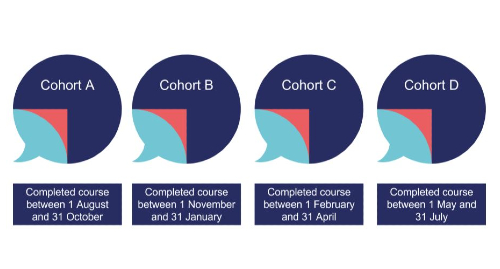Graduate Outcomes survey
What is the Graduate Outcomes survey?
The Graduate Outcomes survey replaces the Destination of Leavers from Higher Education (DLHE) survey, and its longitudinal counterpart, and collects information on what all leavers (UK, EU and international) from higher education (HE) programmes are doing fifteen months after qualifying from their HE course. It aims is to establish what type of employment or further study graduates are engaged in, their income, their "graduate voice" and their subjective wellbeing, during a specific week in the survey period.
Graduate Outcomes FAQs
The response rates for the Graduate Outcomes survey are as follows:
| Sub-population | Response rate target |
| UK domiciled full-time | 60% |
| UK domiciled part-time | 60% |
| Research funded | 65% |
| EU domiciled | 45% |
| Non-EU domiciled | 25% |
All graduates that have completed a higher education course at a higher education provider in the UK after August 2017 will be invited to complete the survey. This can be a course of any type and duration.
Graduates are grouped across the year into four cohorts based on the end date of their course:

Depending on when their course ended, they will receive their survey invitation around 15 months later. For example, if their course ended in August to October 2019, they will receive the survey in December 2020.
The Graduate Outcomes survey is administered by the Higher Education Statistics Agency (HESA) and its partner organisation (please see below). Although Providers (Higher Education and Further Education Institutes) were given the opportunity of feeding into two comprehensive consultations prior to the establishing of the Graduate Outcomes survey and can provide feedback to HESA at any point, the day-to-day running of the survey is entirely managed by HESA.
Other involved parties:
| Organisation | Responsibility |
| Providers | Provide up-to-date and accurate contact details |
| Confirmit | System used to manage the surveying of graduates |
| IFF Research | Responsible for follow up phone calls to graduates |
| Oblong | Undertakes SIC and SOC coding of the Graduate Outcomes responses |
Wherever possible please encourage graduates to keep their contact details up-to-date via the following form: https://www.exeter.ac.uk/alumnisupporters/contactus/updatedetails/.
To ensure GDPR compliance please get in touch with Global Advancement before making unsolicited contact with a graduate via their personal email address. Alternatively you might want to make contact via LinkedIn, and creating a LinkedIn Group is one of the best ways to do this. To this end, please encourage your students to set up a LinkedIn account and to keep this up-to-date.
The Graduate Outcomes survey is mandatory for all UK higher education providers to undertake, with all results being fed back in an anonymised form to the Higher Education Statistics Agency (HESA). It informs the University, current and prospective students, and alumni of potential destinations in each discipline. This is the first official set of data collected after students graduate and is an initial indicator of what they are doing. This is rich information that all staff can use.
Internal - University of Exeter results only
Once HESA has finalised its data collection and cleansing of the Graduate Outcomes data, providers are able to download their own data for internal analysis. This analysis can be found on the MI Hub.
HESA - Sector headlines
The Higher Education Statistics Agency (HESA) release of the 2019/20 Graduate Outcome survey data can be found on their Summary Statistics webpages.
Strategic Performance Indicators
As a result of the Graduate Outcomes survey having a census week 15 months after graduation, and this being applicable to the four cohorts within the annual Graduate Outcomes collection cycle, after HESA analyse and consider the data fit for release, some of the data collected will be nearly 3 years old before Providers see sight of it. As a consequence, although the results are still useful, and continue to impact on our domestic league table rankings, they hold less significance as a dataset that should inform student intervention, strategy and annual planning.
The University has identified 5 datasets that can be used as leading indicators and allow for proactive interventions, in advance of the Graduate Outcomes survey:
- Careers Registration Planning stages
- Careers Registration Work experience
- Credit bearing placement
- Credit bearing employability modules
- Graduate exit survey, e.g., Graduation Careers Registration survey or 6 month Career Destination survey.
Career Destination survey
The Career Destination survey was introduced in January 2019 (2017/18 graduates) in response to the cessation of the Destination of Leavers from Higher Education (DLHE) survey, and the introduction of the more longitudinal Graduate Outcomes survey.
The Career Destination survey has the primary objective of identifying and supporting recent graduates that are struggling to navigate towards their desired career destination, with most of this support coming from trained student staff making telephone calls to our recent graduates. Since this survey is for internal purposes only this allows for a greater amount of flexibility, which has resulted in a more extensive list of subsidiary goals. For more information please see the '2020/21 Career Destination survey report' listed at the bottom of the Graduate Outcomes pages on the MI Hub.

